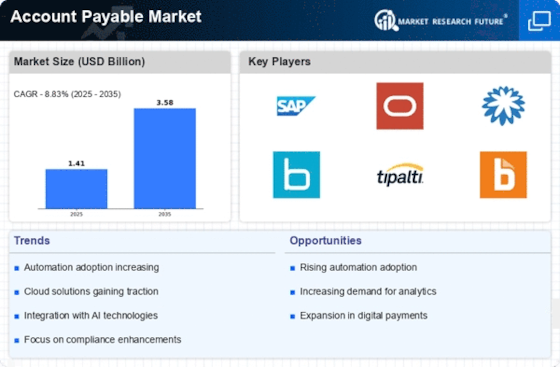Top Industry Leaders in the Account Payable Market

Competitive Landscape of the Account Payable Market:
The account payable (AP) market is a dynamic and growing space, driven by increasing automation, cloud adoption, and the need for improved operational efficiency. Understanding the competitive landscape is crucial for established players and newcomers alike, as it informs strategic decisions and market positioning.
Key Players:
- Sage Group plc (UK)
- Newgen Software Technologies Limited (India)
- OSAS (US)
- Esker (France)
- AvidXchange (US)
- SutiSoft Inc. (US)
- Invoicera (India)
- SAP (Germany)
- Comarch (Poland)
- FIS (US)
- Vanguard Systems (US)
- Zycus Inc.(US)
- Tipalti, Inc. (US)
- Bottomline Technologies (de), Inc. (US)
- Beanworks (Canada)
Strategies Adopted:
- Product Innovation: Continuous development of automation features, artificial intelligence (AI) integration, and machine learning for error detection and data extraction are key differentiators.
- Platform Expansion: Players are expanding their offerings beyond core AP automation to include procure-to-pay (P2P) and order-to-cash (O2C) functionalities, creating integrated enterprise financial platforms.
- Partnerships and Acquisitions: Strategic partnerships with technology providers and acquisitions of complementary solution providers fuel growth and market share expansion.
- Subscription and Pricing Models: The shift from perpetual licensing to cloud-based subscription models is prevalent, with flexible pricing options catering to diverse company sizes and needs.
Factors for Market Share Analysis:
- Target Market: Understanding the company size, industry verticals, and geographical focus of each player reveals their customer segmentation and potential market reach.
- Solution Depth and Breadth: The range of functionalities offered, from basic invoice processing to advanced analytics and supplier collaboration capabilities, determines the player's value proposition.
- Technology and Innovation: Investment in cutting-edge technologies like AI, blockchain, and robotic process automation (RPA) signals a commitment to future-proofing solutions and attracting tech-savvy customers.
- Integration and Scalability: Seamless integration with existing financial systems and scalability to accommodate future growth are crucial for enterprise adoption.
- Customer Satisfaction and Support: Strong customer feedback, high retention rates, and comprehensive support services indicate successful implementation and user satisfaction.
New and Emerging Companies:
- AI-powered solutions: Companies like YayPay and Paperclip are leveraging AI to automate invoice approval workflows, predict payment delays, and optimize cash flow.
- Blockchain-based platforms: Skuchain and Everledger are exploring blockchain technology for secure and transparent invoice tracking and fraud prevention.
- Gig economy-based services: Xolo and Deel are offering on-demand AP processing services, catering to the needs of smaller businesses and startups with fluctuating workloads.
Current Investment Trends:
- Cloud migration: Investments in cloud-based AP automation platforms are soaring, driven by scalability, accessibility, and lower implementation costs compared to on-premise solutions.
- Data analytics and automation: Integration of AI and data analytics tools unlocks deeper insights into spending patterns, supplier performance, and risk management, leading to optimized workflows and cost savings.
- Supplier collaboration: Investments in supplier portals and e-invoicing solutions promote seamless communication and data exchange, improving efficiency and supplier relationships.
- User experience: Simplifying user interfaces, enhancing mobile accessibility, and offering customizable dashboards are critical to improve user adoption and satisfaction.
Latest Company Updates:
October 26, 2023, Companies are increasingly using AI and ML to automate invoice processing, including data extraction, validation, and approval workflows. This helps reduce manual work, improve accuracy, and accelerate payments.
October 26, 2023, Blockchain technology is gaining traction for its potential to improve transparency, security, and efficiency in supply chain finance. This can benefit businesses by facilitating early payment discounts and streamlining working capital management.










